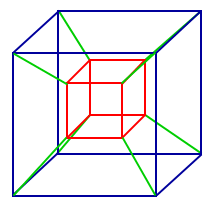
Here’s a problem that makes the round every few years, and each time, it is hotly debated.
You are on a game show. You are presented with a choice of 3 doors: behind one is a luxury car, and behind the other two are nothing. The host asks you pick one of the doors.
After you do this, as part of the game he opens one unpicked doors which he knows is empty. There are now only the door you picked and one remaining door which are unopened. You are asked if you would like to switch your choice. Should you switch?
Presentation Suggestions:
Another version of this problem uses cards in a game called “three-card monte”, often played by scam artists on the streets of New York who prey on easily-duped tourists.
The Math Behind the Fact:
The Monty Hall Problem, or Monty Hall Paradox, as it is known, is named after the host of the popular game show “Let’s Make a Deal” in the 1960’s and 70’s, who presented contestants with exactly this scenario. The answer is YES, you should switch, because the probability that you will find the car by doing so is 2/3. This is because the probability that you picked the correct door in the first place does not change; it is still 1/3, regardless of the game show host’s actions.
Many people are fooled into thinking that once one of the doors is eliminated that the probability between the remaining two doors is now 50-50, but this is incorrect.
There are many ways to expose the fallacy; here’s one heuristic argument. Suppose you play this game 600 times. About 200 times you will pick the right door at the start. Yay! About 400 times you will not. But the game show host will never open the door with the car behind it, so each of those 400 times the car is behind the unopened door that you did not originally pick. So 400 out of 600 times you should switch, i.e., 2/3 of the time.
Another way to see this is to examine an extreme case. Suppose you play this game with a deck of 52 cards, trying to pick the ace of spades, and you pick one card. Now suppose that of the remaining 51 cards, the dealer turns over 50 cards which he knows are not the ace of spades. This leaves one unturned card, aside from the one you picked. Should you switch? Of course! The probability that you picked the correct card to begin with is 1/52, and the probability that it is in the other 51 cards is 51/52. Neither of these probabilities are changed by the dealer’s actions, since he knows the cards and will never turn over the ace of spades. You should therefore switch your choice.
How to Cite this Page:
Su, Francis E., et al. “Monty Hall Problem.” Math Fun Facts. <http://www.math.hmc.edu/funfacts>.
Fun Fact suggested by:
Francis Su

